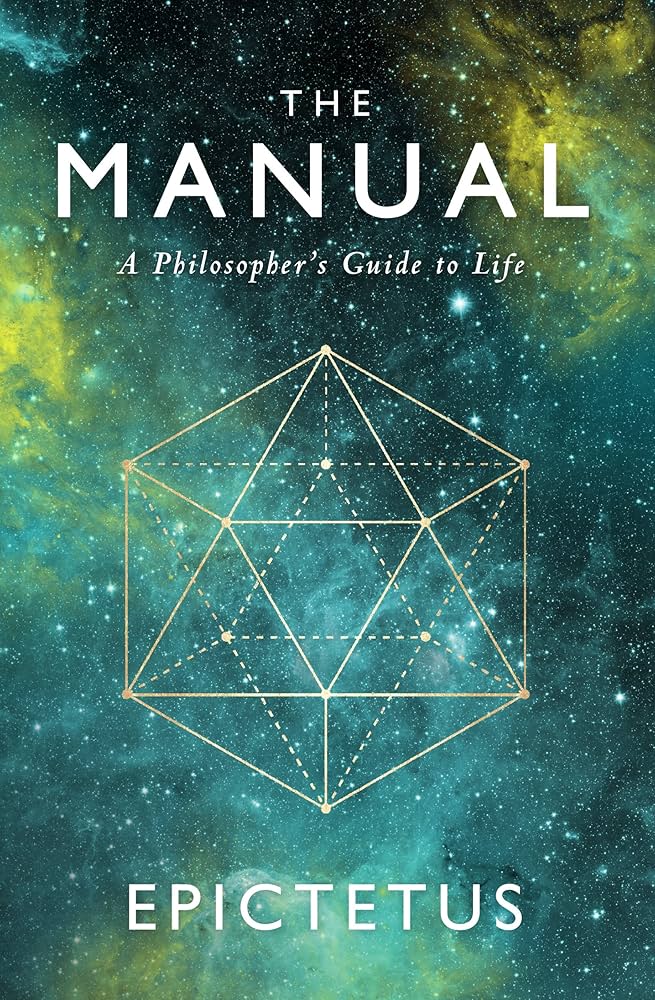
The Manual – Epictetus
Picture this: A former slave becomes one of history’s most influential philosophers, writes nothing down himself, and yet his wisdom survives two millennia to become a self-help sensation among Silicon Valley CEOs and Reddit stoics. That’s Epictetus for you, and “The Manual” is his greatest hits album.
This pocket-sized guide to living well is essentially ancient Rome’s answer to “Don’t Sweat the Small Stuff,” except it deals with big stuff too – like death, loss, and why your neighbor’s noisy chariot should not ruin your day.
Core Message:
The Manual’s central thesis is remarkably simple: we suffer not from events but from our judgments about them. Can’t control something? Don’t waste energy worrying about it. Can control something? Well, get to work then. It’s cognitive behavioral therapy avant la lettre.
The Good:
- Remarkable practicality for a 2,000-year-old text
- Brutal efficiency in delivery (no ancient Greek small talk here)
- Universal applicability of its principles
- Zero fluff – each passage packs a philosophical punch
- Surprisingly modern psychological insights
The Critical Points:
- The Emotional Suppression Problem: Epictetus sometimes seems to advocate for a level of emotional detachment that borders on the inhuman. Sorry, but your dog died and you’re allowed to cry about it.
- Privilege Perspective: Written from the viewpoint of a man who rose from slavery to relative freedom and comfort, it sometimes oversimplifies the relationship between mindset and circumstance.
- Deterministic Worldview: The strict fatalism might be hard to swallow for modern readers who believe in social change and collective action.
- Gender and Social Issues: Let’s just say ancient Rome wasn’t winning any awards for progressive thinking. Some passages haven’t aged well.
- Missing Nuance: The manual’s aphoristic style, while powerful, sometimes leads to oversimplification of complex human experiences.
Standout Passages:
“It’s not things that upset us, but our judgments about things.” (Looking at you, person who just checked their ex’s Instagram)
“Some things are in our control and others not.” (Revolutionary stuff for chronic control freaks)
The Modern Impact:
It’s fascinating how this ancient text speaks to modern anxieties. In an age of endless notifications, social media FOMO, and constant outrage, Epictetus’s message about choosing our concerns wisely hits different. He’s basically telling us to curate our emotional news feed.
The Bottom Line:
The Manual is like a tough-love therapist from the ancient world – it tells you what you need to hear, not what you want to hear. Yes, some of its advice might seem harsh, and yes, some of its cultural context is outdated, but its core insights about human nature and happiness remain startlingly relevant.
Rating: ⭐⭐⭐⭐½ out of 5
Perfect for: Overthinkers, control freaks, and anyone trying to maintain sanity in a chaotic world
Not for: Those seeking warm fuzzies or validation of their daily dramas
Final Thought:
In a world of 300-page self-help books that could be condensed to a tweet, there’s something refreshing about The Manual’s brevity and directness. It’s like getting philosophical tough love from your no-nonsense ancient Roman grandfather. Just remember, like any manual from 2,000 years ago, some assembly of modern context is required.